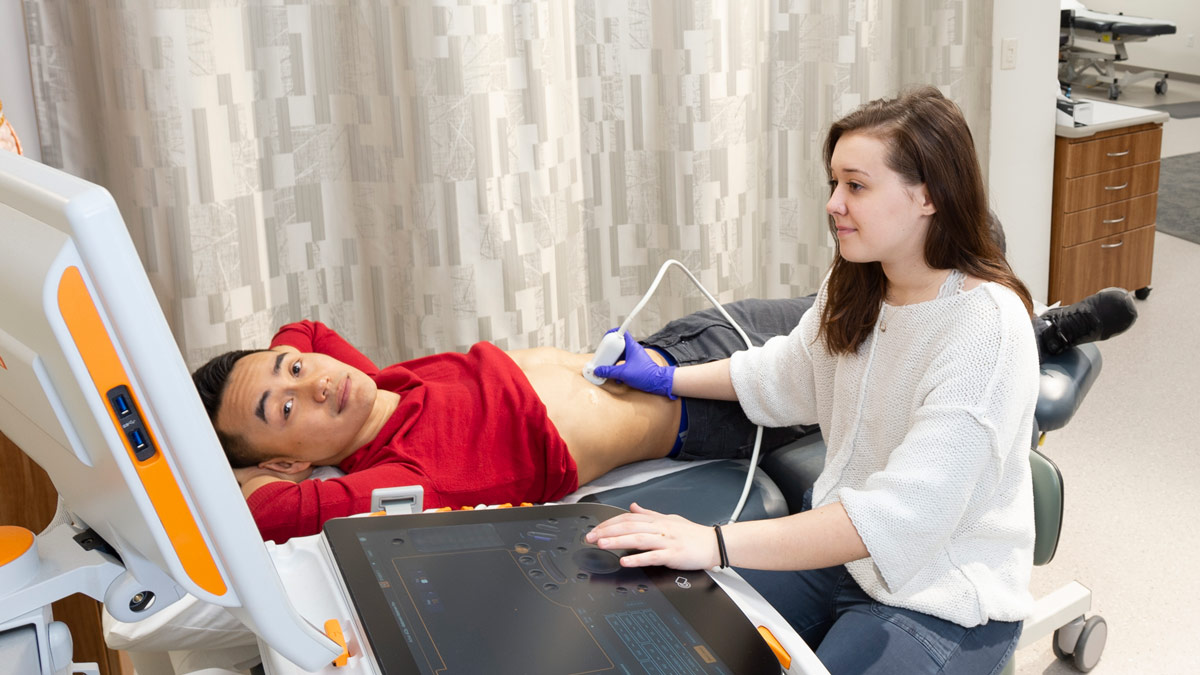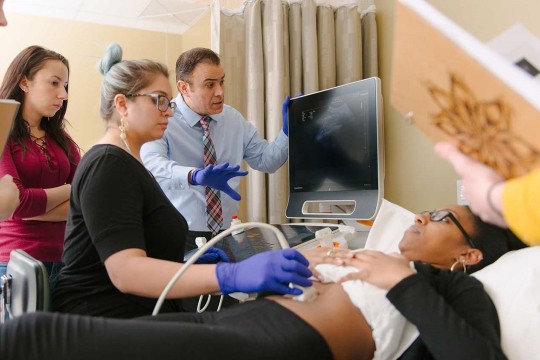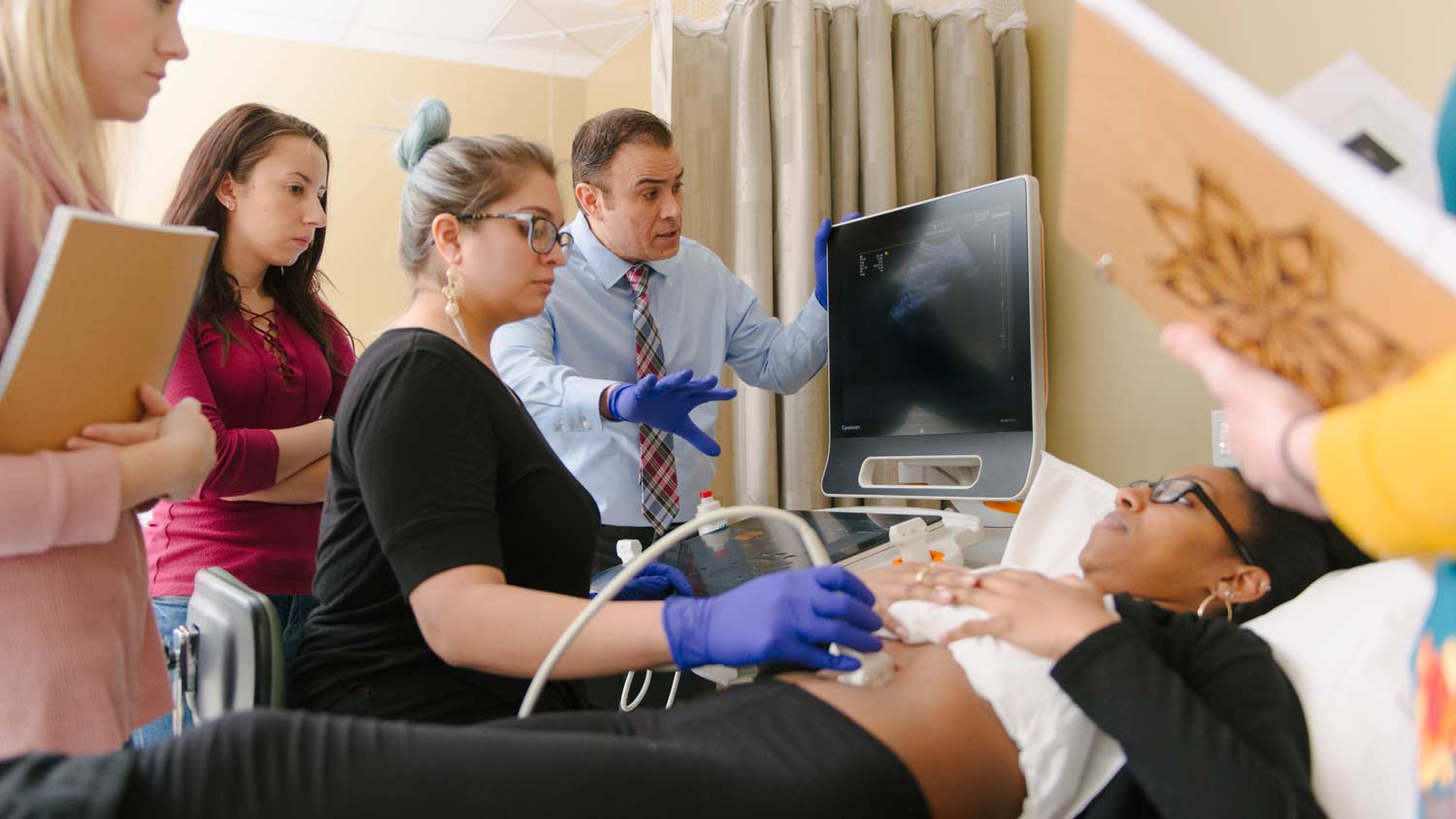Diagnostic Medical Sonography (Ultrasound) Certificate

Diagnostic Medical Sonography (Ultrasound)
Certificate
- RIT /
- Rochester Institute of Technology /
- Academics /
- Diagnostic Medical Sonography (Ultrasound) Certificate
Dive deeper into the different disciplines of sonography–including abdominal, obstetrical, gynecological, small parts examination, and much more–as you further your understanding of ultrasound technology.
Overview for Diagnostic Medical Sonography (Ultrasound) Certificate
The diagnostic medical sonography certificate is an 18-month program that includes a clinical internship. The program–which focuses on various abdominal, gynecological, obstetrical, and small parts examinations including certain vascular studies–has been designed to meet and exceed the objectives of the Joint Review Committee on Education in Diagnostic Medical Sonography of the Commission on Accreditation of Allied Health Education Programs (CAAHEP). It was created to produce competent, compassionate, and responsible ultrasound professionals and leaders. The certificate is available to all registered allied health practitioners as well as to those holding an associate or bachelor’s degree in a relevant discipline. The program includes lectures and course work integrated with a clinical internship. Dependent on a student’s previous degree, certain prerequisite courses may be required prior to enrollment. Required prerequisite courses include one year of anatomy and physiology with laboratories and one year of college or general physics with laboratories.
Graduates earning the certificate will:
- be prepared as competent entry-level general sonographers in the cognitive (knowledge), psychomotor (skills), and affective (behavior) learning domains;
- gain a thorough working knowledge of ultrasound scanning techniques;
- be skilled in the operation of ultrasound instrumentation and laboratory equipment;
- acquire the proper manner in working with patients; and
- under the guidance of faculty and professional staff, be capable of scheduling and performing the daily workload of ultrasound procedures, evaluating new procedures where necessary, and supervising other technical personnel.
Plan of Study
During the first academic year, students complete all the prerequisite courses required to enter the clinical internship phase of the program. Students also apply, polish, and test their clinical skills and techniques in the on-campus ultrasound scanning suite, which is equipped with a variety of ultrasound equipment. Following a required two-week pre-clinical internship orientation session, students begin their training at the first of two assigned clinical training sites.
Careers and Clinical Internships
Clinical Internships
The one-year clinical internship provides hands-on experience at two or more approved medical facilities. After completing the pre-internship course work, all students begin the internship by attending an intensive two-week experience on campus. During this time they enhance and polish the skills they previously learned, prepare to perform complete sonographic examinations as performed in real clinical settings, and advance their knowledge in recognizing anatomy and disease states using a variety of equipment in the Ultrasound Scanning Suite. Students also learn about hospital, departmental, and administrative operations. After completing these requirements, candidates are assigned to a medical training site for their clinical experience. At these facilities, students work side-by-side with sonographers, physicians, and other health care professionals to learn, develop, apply, and sharpen the necessary skills to perform general ultrasound examinations. Students’ clinical progress and performance are closely monitored by the program’s clinical coordinator and program director, who have regular communication and make periodic visits to the clinical internship sites. Additionally, students return to campus each month for three days of lectures, presentations, projects, and testing. Students may complete their clinical internships at any approved regional or national medical ultrasound facility, with approval of the program director.
Featured Work and Profiles
-
Breaking Boundaries: RIT Grad Merges Sonography and PA Studies for Comprehensive Patient Care
Zayneb Ghazle '24 became the first student to graduate with a double major in diagnostic medical sonography (ultrasound) and the physician assistant BS/MS program.
Read More about Breaking Boundaries: RIT Grad Merges Sonography and PA Studies for Comprehensive Patient Care
Curriculum for 2024-2025 for Diagnostic Medical Sonography (Ultrasound) Certificate
Current Students: See Curriculum Requirements
Diagnostic Medical Sonography, certificate, typical course sequence
| Course | Sem. Cr. Hrs. | |
|---|---|---|
| First Year | ||
| DCHP-333 | Patient Care |
2 |
Students will be introduced to key elements of integrated, high-quality patient care. Through lectures, videos, demonstrations, and discussions essential aspects of team-based patient care will be explored. Vital skills and behaviors such as professionalism, communication, documentation, workplace safety, patient assessment, patient positioning and transfers will be presented. Infection control, global health issues, and medications will also be examined. Students will be encouraged to share their personal experiences and thoughts about class topics. (Prerequisites: (BIOL-123 and BIOL-125 and BIOL-124 and BIOL-126) or (BIOL-101 and BIOL-102 and BIOL-103 and BIOL-104) or (BIOL-121 and BIOL-122) or equivalent courses.) Lecture 2 (Spring). | ||
| DCHP-415 | Pathophysiology of Organ Systems I |
3 |
This course is designed to provide the students with the necessary foundation of the physiologic and pathologic processes that underlie the spectrum of human disease entities and is taught in the context of clinical scenarios that demonstrate the basic science principles in a real-world context of health care. Emphasis is placed on the fundamental principles of cell injury and repair, infection, neoplasia, and inflammation as well as hemodynamic disorders, thromboembolic disease and shock. Additional emphasis is placed on organ systems and their disorders such as the circulatory, liver, gallbladder and biliary systems. Material is presented in the context of case studies, utilizing clinical findings and addressing underlying basic physiologic, biochemical and immunologic processes as they relate to patient care and individual patient problem cases. (Prerequisites: Restricted to students in the College of Health Sciences and Technology with at least 3rd year standing who have completed MEDS-250 and MEDS-251 or equivalent courses.) Lecture 3 (Fall). | ||
| DMSO-301 | Sonographic Scanning Skills and Techniques I |
3 |
The course provides students with hands-on experience by performing basic and general abdominal, small parts, obstetrical and gynecological ultrasound examinations. Sonographic examination protocols and techniques, review and recognition of normal anatomic structures, high quality image production, and image interpretation are stressed. (Prerequisites: DMSO-BS or DMSO-CT and YR 3) Lec/Lab 6 (Fall). | ||
| DMSO-302 | Sonographic Scanning Skills and Techniques II |
3 |
The course is a continuation of Sonographic Scanning Skills and Techniques I (DMSO- 301). The course provides students with further hands-on opportunities to perform advanced abdominal and OB/GYN, peripheral vascular (upper and lower) and carotid Doppler examinations including color flow. Ultrasound examination protocols and techniques, review and recognition of normal anatomic structures, high quality image production, Doppler and color flow optimization and image interpretation are stressed. (Prerequisites: DMSO-301 or equivalent course.) Lec/Lab 6 (Spring). | ||
| DMSO-309 | Sonography Physics and Instrumentation I |
3 |
This course addresses how the principles of ultrasound physics are directly applied to the use of ultrasound instrumentation in medical imaging. Transducers, signal production, memory systems, data display, manipulation of controls, and artifacts, are discussed. Throughout the course, the student will integrate previous knowledge of anatomy with ultrasound physics and instrumentation. (Prerequisites: PHYS-112 or equivalent course and student standing in DMSO-CT, DMSO-BS or ECHO-CT.) Lec/Lab 6 (Fall). | ||
| DMSO-310 | Sonography Physics and Instrumentation II |
3 |
This course is a continuation of Sonography Physics and Instrumentation I (DMSO-309). It provides a foundation of the basic physical principles of ultrasound and the fundamentals of fluid dynamics, Doppler physics including color, power, and spectral Doppler, quality control, Doppler artifacts, and biological effects. Students will learn to integrate previous knowledge of anatomy, ultrasound physics and instrumentation with Doppler skills and techniques. Development of scanning techniques, use of instrument controls, and production of high quality diagnostic images utilizing laboratory equipment are stressed. (Prerequisites: DMSO-309 or equivalent course.) Lec/Lab 6 (Spring). | ||
| DMSO-312 | Human Cross-Sectional Anatomy |
3 |
This course covers basic sectional anatomy of the abdomen, pelvis, fetus and small parts, building on the basic knowledge of anatomy. This course prepares the student to recognize sectional anatomy of major human structures, especially as they relate to medical imaging techniques. Lectures are augmented with exercises using prepared human sections, organ modeling, and diagnostic imaging units. (Prerequisites: DMSO-BS or DMSO-CT and YR 3) Lecture 3 (Fall). | ||
| Second Year | ||
| DMSO-414 | Sonographic Vascular Evaluation |
3 |
This course provides knowledge of general vascular evaluation with an emphasis on the Sonographic approach. Two-dimensional real-time imaging and Doppler techniques are presented as well as a discussion of other imaging modalities and their use in vascular evaluation. Performance of examinations on laboratory equipment is stressed. (Prerequisites: DMSO-BS or DMSO-CT and YR 4) Lec/Lab 3 (Spring). | ||
| DMSO-452 | Obstetrical Sonography I |
3 |
This course provides the ultrasound candidate with the knowledge necessary to perform obstetrical examinations. High-quality image production, recognition of normal structures, and basic pathologic states are stressed. Examination protocols, review of specific anatomy and pathology, film reading, and use of other imaging techniques are also addressed. (Prerequisites: DMSO-BS or DMSO-CT and YR 4) Lec/Lab 3 (Fall). | ||
| DMSO-453 | Gynecological Sonography |
3 |
This course provides the information necessary to perform basic and advanced gynecologic Sonographic examinations. Examination strategies for various procedures are explored, as well as the integration of ultrasound into established clinical practices. (Prerequisites: DMSO-BS or DMSO-CT and YR 4) Lec/Lab 4 (Fall). | ||
| DMSO-454 | Obstetrical Sonography II |
3 |
This course provides information necessary to perform more sophisticated obstetrical procedures utilizing ultrasound equipment. Examination strategies for various procedures are explored as well as the integration of ultrasound into established clinical practices. (Prerequisites: DMSO-BS or DMSO-CT and YR 4) Lec/Lab 3 (Spring). | ||
| DMSO-456 | Abdominal and Small Parts Sonography I |
3 |
Laboratory simulation and classroom instruction are used to develop practical skills and clinical knowledge necessary to perform basic abdominal and small parts examinations utilizing ultrasound equipment. High-quality image production, recognition of normal abdominal structures and basic pathologic states are stressed. Examination protocols, review of anatomy, film reading, and use of other scanning techniques are addressed. (Prerequisites: DMSO-BS or DMSO-CT and YR 4) Lec/Lab 4 (Fall). | ||
| DMSO-457 | Abdominal and Small Parts Sonography II |
3 |
This course is a continuation of Abdominal and Small Parts Sonography I (DMSO-456). Laboratory simulation and classroom instruction are used to develop the practical skills and clinical knowledge necessary to perform basic and advanced abdominal and small parts examinations utilizing ultrasound. High-quality image production, recognition of normal abdominal structures and basic and advanced pathologic states are stressed. Examination protocols, review of anatomy, film reading and use of other scanning techniques are addressed. (Prerequisites: DMSO-BS or DMSO-CT and YR 4) Lec/Lab 4 (Spring). | ||
| DMSO-460 | Administration and Research in Sonography (WI-PR) |
3 |
Speaking, writing, and researching skills are explored. Methods of basic research, developing writing strategies, and oral presentations are stressed. Students develop or critique a research project and prepare a written document following common publishing guidelines in addition to making oral presentations. Additionally, candidates prepare a complete plan for an ultrasound department as if they had been hired to establish a new department in a hospital setting. The candidates work together to develop the physical facilities, administrative, and financial aspects of a department. (Prerequisites: DMSO-BS or DMSO-CT and YR 4) Lecture 3 (Spring). | ||
| DMSO-570 | Clinical Sonography I |
7 |
This course prepares the student for application of classroom knowledge to the practice of ultrasound by means of a clinical internship. Performing basic general ultrasound examinations in the areas of abdomen, small parts, obstetrics, gynecology and basic peripheral vascular in both the laboratory and clinical settings is stressed. Nursing procedures, ethical issues, and medico-legal considerations are also discussed as they relate to the practice of ultrasound examinations. This is an internship course. (Prerequisites: DMSO-BS or DMSO-CT and YR 4) Lec/Lab 7 (Fall). | ||
| DMSO-571 | Clinical Sonography II |
5 |
This course provides the final development of ultrasound examination skills by means of clinical internship. The candidate is expected to perform basic and advanced general ultrasound examinations in the areas of abdomen, small parts, obstetrics, gynecology and peripheral ultrasound examinations with no assistance by the end of this course. This is an internship course. (Prerequisites: DMSO-570 or equivalent course.) Lec/Lab 5 (Spring). | ||
| Total Semester Credit Hours | 53 |
|
Admissions and Financial Aid
Transfer Admission
Only transfer students are eligible to apply for this certificate program.
Appropriate associate degree programs for transfer
AS degree in liberal arts with science option; allied health; radiologic technology
Financial Aid and Scholarships
100% of all incoming transfer students receive aid.
RIT’s personalized and comprehensive financial aid program includes scholarships, grants, loans, and campus employment programs. When all these are put to work, your actual cost may be much lower than the published estimated cost of attendance.
Learn more about financial aid and scholarships
Accreditation
The Abdomen-Extended, Obstetrics and Gynecology, and Adult Cardiac DMS Program at Rochester Institute of Technology is accredited by the Commission on Accreditation of Allied Health Education Programs (www.caahep.org) upon the recommendation of the Joint Review on Education in Diagnostic Medical Sonography (JRC-DMS).
CAAHEP
9355 - 113th St. N, #7709
Seminole, FL 33775
727-210-2350
www.caahep.org
JRC-DMS
6021 University Blvd., Suite 500
Ellicott City, MD 21043
443-973-3251
www.jrcdms.org
It is noteworthy to mention that the diagnostic medical sonography degree is institutionally accredited and programmatically accredited. This type of dual accreditation meets both professional and employer requirements and also allows our graduates to immediately sit for the national board examinations administered by the American Registry of Diagnostic Medical Sonography (ARDMS).
Related News
-
November 12, 2024

EchoMentor creates a new wave of sonographers
Hayley Bartkus and Christina Werth created EchoMentor as an educational platform for healthcare professionals working in sonography or ultrasound, a medical imaging method that uses sound waves to peer inside the body.
-
February 14, 2020

Carestream Health donates $1.2 million in ultrasound equipment to RIT
Carestream Health Inc. continues to support the education of sonographers at RIT through a new donation of ultrasound equipment valued at more than $1.2 million. This is the second donation Carestream has made during this academic year to RIT’s diagnostic medical sonography program, with a combined total exceeding $1.4 million.
-
April 28, 2018

RIT grad returns to West Coast for ‘dream job’
Cynthia Walker is on the cusp of a health-care career focusing on the heart. She graduates from RIT on May 11 with a BS from the School of Individualized Study and a certificate in echocardiography, or ultrasound of the heart, from the College of Health Sciences and Technology.
Contact
- Hamad Ghazle
- Department Head of Clinical Health Professions
- Department of Clinical Health Professions
- College of Health Sciences and Technology
- 585‑475‑2241
- hhgscl@rit.edu











